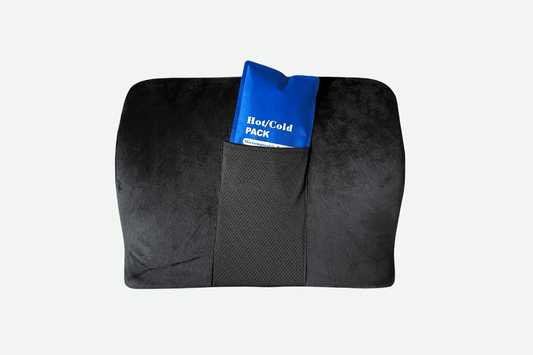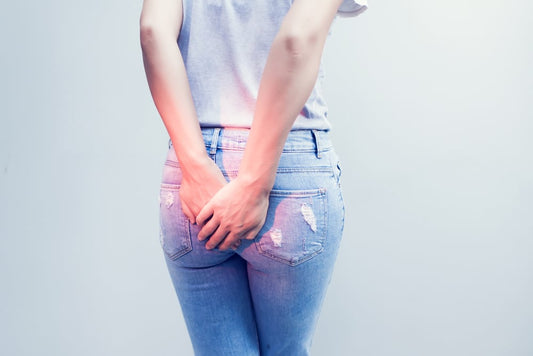Can Hemorrhoids Last For Years? Why Your Hemorrhoids Won't Go Away
Robert Cutler, D.O., FAOCPrShare
For being such a small group of veins in your lower rectum, hemorrhoids cause their fair share of unpleasant symptoms. When suffering from a flare-up, even short lived relief goes a long way, and home remedies like hemorrhoid cream can improve itchy or burning skin almost immediately.
But what happens if the symptoms persist? Is it possible - can hemorrhoids last for years? Keep reading to learn more about the lifespan and long term effects of hemorrhoids, and how to heal chronic hemorrhoids that just won’t seem to quit.
What are Hemorrhoids?
Hemorrhoids are veins in your lower rectum that remain dormant until affected by pressure or straining. Internal hemorrhoids swell inside the rectum, where they either remain or prolapse outside the anus. External hemorrhoids form under the skin around the anus, causing symptoms that include itching, burning and bleeding. Like external hemorrhoids, prolapsed hemorrhoids can form purplish, grape-like lumps that may also bleed.
You might not realize you suffer from hemorrhoids until noticing drops of blood on your toilet paper or in the toilet, as is common with internal hemorrhoids. Recognizing the symptoms of hemorrhoids is important for diagnosis, otc treatment, and knowing when it’s time to seek medical attention.
Take a look at our dedicated resource page on hemorrhoids for more information: https://doctorbutlers.com/resources/what-are-hemorrhoids/
What Happens When Hemorrhoids Are Left Untreated?
Typically, hemorrhoids are a treatable condition that respond to at-home care or non-invasive medical procedures. What happens if hemorrhoids go untreated, however, is a different story. First, let’s discuss the various grades of hemorrhoids, as the severity of symptoms will often determine how to treat them (and may affect the likelihood of recurrence).
- Grade I — Visible hemorrhoids that do not prolapse.
- Grade II — Hemorrhoids that prolapse but go back in on their own.
- Grade III — Hemorrhoids that prolapse and need manual reduction.
- Grade IV — Nonreducible hemorrhoids, aka fully prolapsed.
While Grade I hemorrhoids are internal and usually painless, failure to address them will result in a worsening condition. Pressure or straining on a Grade I hemorrhoid can lead to increased and recurring inflammation, worsening pain, or a prolapsed hemorrhoid.
Prolapsed and large external hemorrhoids are more susceptible to infection, and worse, strangulated or thrombosed hemorrhoids are at risk of bursting. If at-home treatments work in the short term but the hemorrhoids persist, it’s time to seek medical attention. Any unusual or large amount of bleeding should be addressed by a doctor immediately.
We often get questions from those with persistent symptoms about any links between hemorrhoids and cancer, because symptomatically they can both involve pain and bleeding from the rectum. Can hemorrhoids cause cancer if left untreated? No, they can’t, but because hemorrhoids share many of the same symptoms as colorectal cancer, it’s important to consult a medical professional when experiencing these symptoms so they can confirm the source of your discomfort.
Doctor’s Note: as a practitioner of colorectal health, Dr. Cutler recommends a colonoscopy to check for cancer and precancerous polyps for everyone 35 or older, and younger than that if you have a family history of cancer. Make sure you get checked every seven years if no polyps were found and return to the doctor in one to three years if polyps were present.
For more detailed information on hemorrhoid size, duration and bleeding, check out our articles dedicated to the topics below:
- How Long Do Hemorrhoids Last
- Hemorrhoid Bleeding How Much Is Normal
- How Big Can Hemorrhoids Get
Factors That Contribute to Chronic Hemorrhoids
Identifying factors that contribute to hemorrhoids is an important starting point for learning how to get rid of chronic hemorrhoids. Stubborn hemorrhoids that continue to flare-up for weeks after treating symptoms may be indicative of one or more of these issues at work:
- Chronic constipation or diarrhea
- Poor diet - including dairy, processed food, fast food and sugar
- Medical conditions
- Obesity
- Pregnancy
- Age
- Vitamins & Supplements - an excess of fat-soluble vitamins can cause constipation (including vitamins A, D, E, K and iron)
What to Do About Hemorrhoids That Won’t Go Away
Can internal hemorrhoids last for years? Can external hemorrhoids last for years? These are legitimate concerns when your hemorrhoids just won’t seem to quit. If you’re worried about developing chronic hemorrhoids, incorporating lifestyle changes and using over-the-counter medication will help begin to prevent and heal hemorrhoids before they have a chance to reignite.
How long do chronic hemorrhoids last? While unpleasant symptoms should dissipate after a few days of at-home care, chronic sufferers may be dealing with the indefinite recurrence of hemorrhoids. More severe symptoms (such as consistent rectal bleeding) require medical office treatments such as:
- Rubber band ligation
- Endoscopic banding
- Photocoagulation (internal hemorrhoids only)
- Sclerotherapy
Surgical options are typically a last resort and include a hemorrhoidectomy or a procedure for prolapse and hemorrhoids (PPH, also called a stapled hemorrhoidectomy).
Persistent Hemorrhoids? Try Doctor Butler’s!
Whether your hemorrhoids are one-and-done or here to stay, Doctor Butler’s is the perfect choice for home treatment Our line of hemorrhoid care products has you covered from prevention to pain relief. Award-winning and infused with natural ingredients, our products medicate and heal flare-ups from chronic hemorrhoids and help reduce the long term prognosis of both internal and external hemorrhoids. The remedy for hemorrhoid relief is in your hands with Doctor Butler’s!
Medical Sources
- Mayo Clinic Staff. (2019). Hemorrhoids. mayoclinic.org/diseases-conditions/hemorrhoids/diagnosis-treatment/drc-20360280


